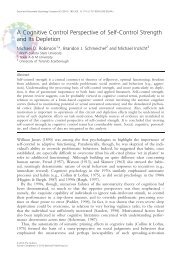Emotions and self-control 1 Incidental and Integral ... - Michael Inzlicht
Emotions and self-control 1 Incidental and Integral ... - Michael Inzlicht
Emotions and self-control 1 Incidental and Integral ... - Michael Inzlicht
Create successful ePaper yourself
Turn your PDF publications into a flip-book with our unique Google optimized e-Paper software.
<strong>Emotions</strong> <strong>and</strong> <strong>self</strong>-<strong>control</strong> 18<br />
two of the experiments reported by Tice et al. (2001), participants <strong>self</strong>-reported their emotional<br />
states. Indulgence did not clearly produce an increase in positive emotions in either study. The<br />
authors suggested that their mood measures may have lacked sensitivity to find subtle changes in<br />
mood, or that the benefits of indulgence were too fleeting to be detected at the end of the<br />
experiments. However, they argued against these possibilities <strong>and</strong> concluded that indulgence<br />
does not actually improve mood <strong>and</strong> that people are mistaken in their belief that indulgence will<br />
improve moods. More research is needed on this seeming lack of insight into the hedonic<br />
benefits of indulgence <strong>and</strong> on the limits of indulgence as a mood regulation strategy.<br />
Compared to the hedonic emotion regulation explanation for the effects of negative<br />
emotions on <strong>self</strong>-<strong>control</strong>, much less consensus exists for explaining the effects of positive<br />
emotions on <strong>self</strong>-<strong>control</strong>. Perhaps this is because positive emotions can both help <strong>and</strong> hurt <strong>self</strong>-<br />
<strong>control</strong>. As we saw, positive emotions tended to increase delay of gratification in kids. A h<strong>and</strong>ful<br />
of explanations were proposed for this effect but none have been supported. Fry (1975)<br />
speculated that positive emotions heighten <strong>self</strong>-efficacy <strong>and</strong> expectations for success, thereby<br />
enabling kids to pursue delayed reward. Moore <strong>and</strong> colleagues (1976) thought that positive<br />
emotions allow kids to attend to broader, long-term interests, thereby increasing delay behavior.<br />
And Fry (1977) suggested that positive emotions serve as a buffer that allows kids to tolerate the<br />
more aversive course of action (e.g., not playing with a desired toy) needed to delay gratification.<br />
In adults, unlike in children, positive emotions tend to reduce delay of gratification, so<br />
the proposed explanations here are different. Hirsh et al. (2010) proposed that positive emotions<br />
prime reward-seeking tendencies, especially for extraverts. Augustine <strong>and</strong> Larsen (2011) thought<br />
that mood regulation accounts for reduced delay under positive emotions. That is, because<br />
people tend to want to maintain positive emotions, those who are currently feeling good opt for



